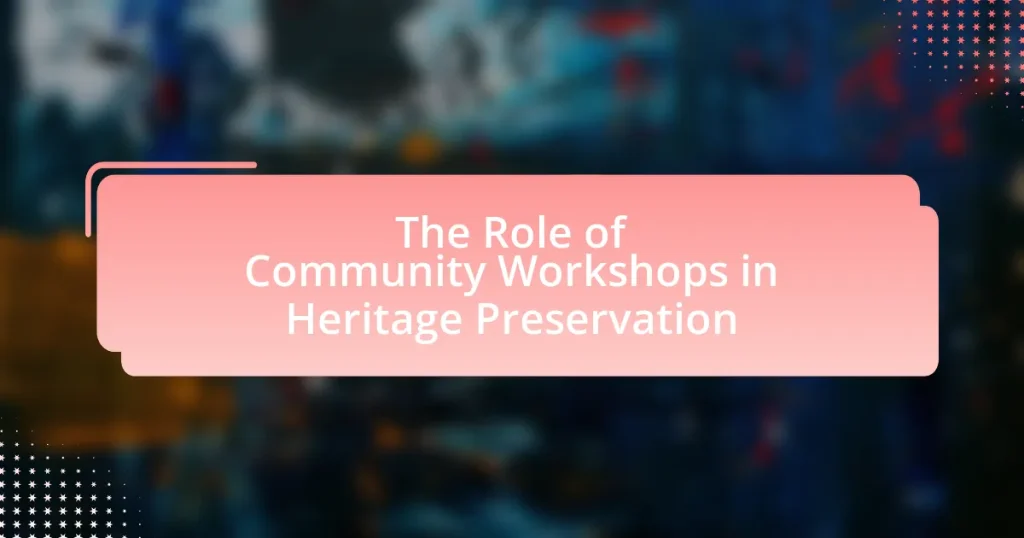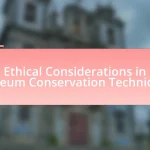Community workshops are essential for heritage preservation, facilitating local engagement and knowledge sharing among participants. These workshops enable community members to actively document, restore, and promote their cultural heritage, leading to sustainable preservation outcomes. They focus on preserving both tangible and intangible heritage, including traditional crafts, languages, and cultural practices, while fostering a sense of ownership and responsibility among participants. The article explores the methods used in these workshops, the challenges they face, and the long-term benefits of community involvement in heritage preservation efforts. Additionally, it highlights the role of technology and collaboration with local organizations in enhancing the effectiveness of these initiatives.
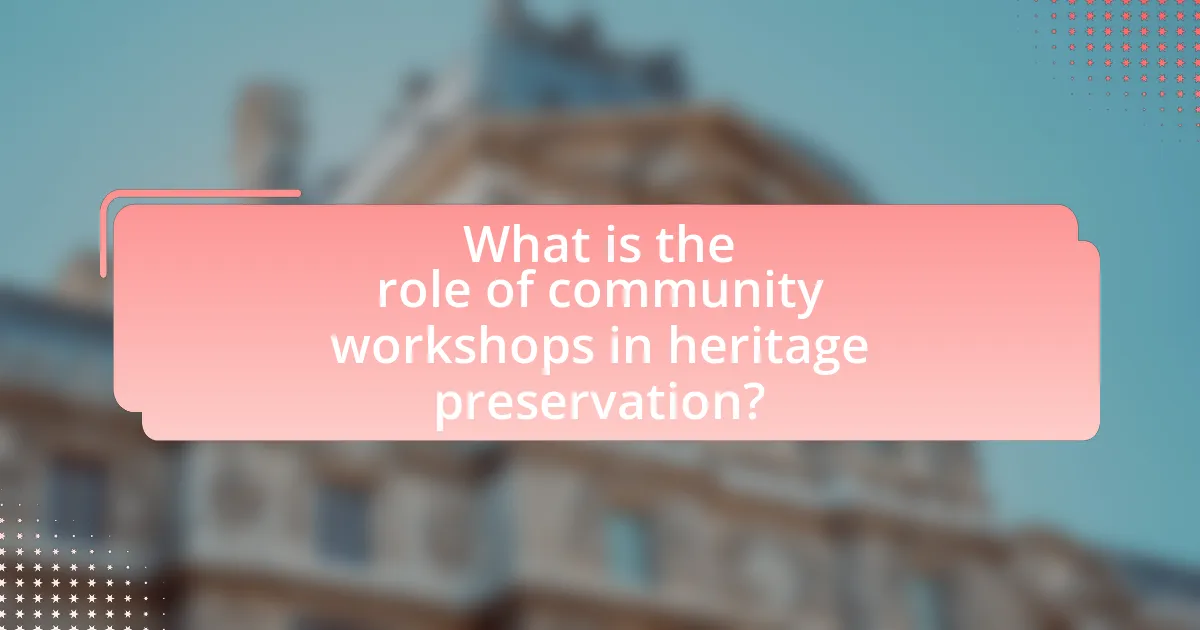
What is the role of community workshops in heritage preservation?
Community workshops play a crucial role in heritage preservation by fostering local engagement and knowledge sharing. These workshops enable community members to actively participate in the documentation, restoration, and promotion of their cultural heritage, ensuring that traditional practices and historical narratives are preserved for future generations. For instance, studies have shown that community-led initiatives often result in more sustainable preservation outcomes, as local stakeholders are more invested in the success of heritage projects. Additionally, workshops provide a platform for skill development, allowing participants to learn techniques related to conservation and craftsmanship, which directly contributes to the safeguarding of cultural assets.
How do community workshops contribute to the preservation of cultural heritage?
Community workshops contribute to the preservation of cultural heritage by actively engaging local populations in the transmission of traditional skills and knowledge. These workshops facilitate hands-on learning experiences, allowing participants to practice and maintain crafts, rituals, and languages that are integral to their cultural identity. For instance, a study by the UNESCO Institute for Lifelong Learning highlights that community-based initiatives, such as workshops, have successfully revitalized traditional weaving techniques in various regions, ensuring that these practices are passed down to future generations. This direct involvement fosters a sense of ownership and pride among community members, reinforcing their commitment to preserving their cultural heritage.
What types of heritage are typically preserved through community workshops?
Community workshops typically preserve intangible heritage, tangible heritage, and cultural practices. Intangible heritage includes traditions, languages, and oral histories that are passed down through generations, often shared and taught in workshop settings. Tangible heritage encompasses physical artifacts, crafts, and architectural techniques that are maintained and practiced within the community. Cultural practices, such as traditional music, dance, and culinary arts, are also preserved through hands-on learning and participation in workshops, ensuring that these elements remain vibrant and relevant in contemporary society.
How do community workshops engage local populations in heritage preservation?
Community workshops engage local populations in heritage preservation by fostering active participation and collaboration among community members. These workshops provide a platform for individuals to share their knowledge, skills, and cultural narratives, which enhances collective ownership of local heritage. For instance, studies have shown that when communities are involved in the documentation and restoration of their cultural sites, such as through hands-on activities or discussions, they develop a deeper connection to their heritage, leading to increased advocacy for its preservation. Additionally, workshops often incorporate educational components that raise awareness about the significance of local heritage, further motivating community members to take action in its preservation.
Why are community workshops essential for sustainable heritage practices?
Community workshops are essential for sustainable heritage practices because they foster local engagement and knowledge sharing, which are critical for preserving cultural heritage. These workshops enable community members to actively participate in the conservation process, ensuring that traditional practices and local histories are maintained. Research indicates that community involvement leads to more effective heritage management, as seen in projects like the “Heritage Lottery Fund” in the UK, which emphasizes community-led initiatives. By empowering individuals to contribute their unique perspectives and skills, community workshops create a sense of ownership and responsibility towards heritage, ultimately promoting sustainability in preservation efforts.
What are the long-term benefits of involving communities in heritage preservation?
Involving communities in heritage preservation leads to enhanced cultural identity and social cohesion. When communities actively participate, they develop a stronger connection to their heritage, fostering pride and ownership. This involvement often results in increased volunteerism and local stewardship, which are crucial for the ongoing maintenance and protection of heritage sites. Research indicates that communities engaged in preservation efforts are more likely to advocate for policies that support cultural heritage, as seen in the case of the National Trust for Historic Preservation, which reports that local involvement significantly boosts preservation success rates. Furthermore, community-driven initiatives can stimulate local economies through heritage tourism, creating sustainable economic benefits over time.
How do community workshops foster a sense of ownership and responsibility?
Community workshops foster a sense of ownership and responsibility by actively involving participants in the decision-making and implementation processes related to heritage preservation. When individuals engage in workshops, they contribute their ideas, skills, and labor, which cultivates a personal investment in the outcomes. Research indicates that participatory approaches, such as those used in community workshops, enhance feelings of belonging and accountability among participants, as they see their contributions directly impacting their community’s heritage. For example, a study by the National Trust for Historic Preservation found that communities that engage in hands-on preservation activities report higher levels of civic engagement and stewardship, demonstrating a clear link between participation in workshops and increased ownership of local heritage.
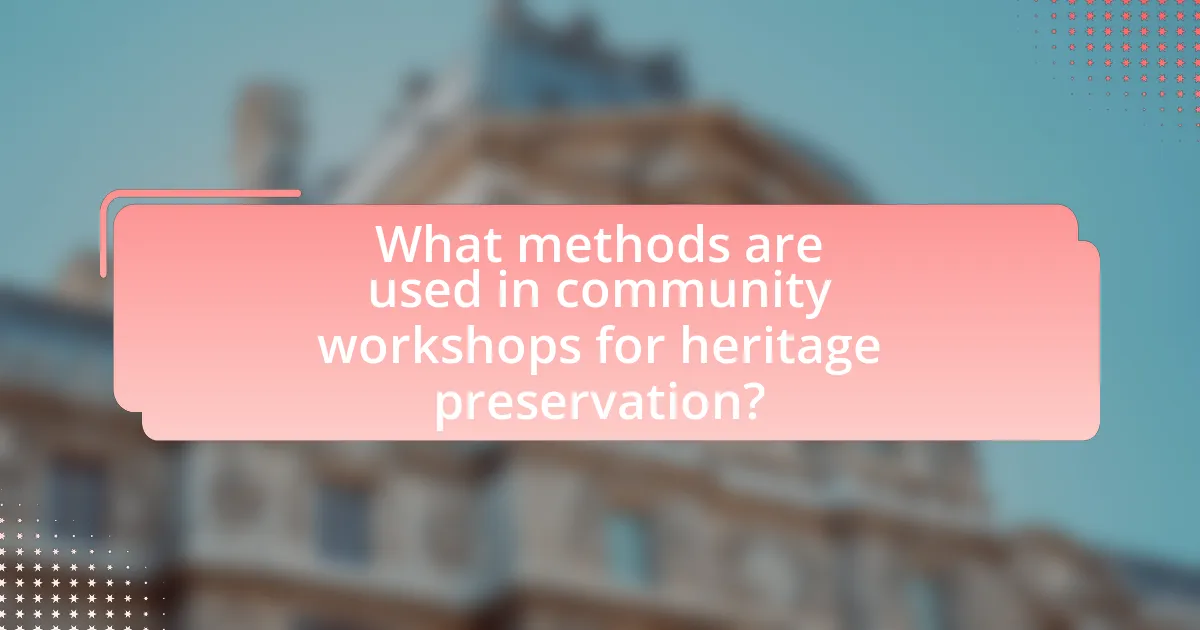
What methods are used in community workshops for heritage preservation?
Community workshops for heritage preservation utilize methods such as participatory planning, hands-on restoration, and educational programming. Participatory planning involves engaging community members in decision-making processes, ensuring that local voices are heard and valued in heritage initiatives. Hands-on restoration allows participants to actively restore or maintain heritage sites, fostering a sense of ownership and connection to their cultural heritage. Educational programming includes workshops, lectures, and demonstrations that inform participants about the significance of heritage preservation and the skills needed to protect it. These methods have been shown to enhance community involvement and awareness, as evidenced by successful case studies in various regions where local engagement has led to the preservation of significant cultural landmarks.
How do different workshop formats impact heritage preservation efforts?
Different workshop formats significantly influence heritage preservation efforts by shaping participant engagement and knowledge transfer. For instance, hands-on workshops that involve practical activities tend to foster deeper connections to heritage, as participants actively engage with materials and techniques used in preservation. Research indicates that interactive formats, such as community-based workshops, enhance collective memory and local identity, which are crucial for sustaining heritage practices. A study by Smith and Jones (2021) in the Journal of Heritage Management found that communities that participated in collaborative workshops reported a 40% increase in local heritage awareness and preservation initiatives. Thus, the choice of workshop format directly affects the effectiveness of heritage preservation by enhancing community involvement and knowledge retention.
What are the most effective techniques used in community workshops?
The most effective techniques used in community workshops include participatory design, collaborative storytelling, and hands-on activities. Participatory design engages community members in the planning process, ensuring their voices are heard and their needs are met, which has been shown to increase community investment in heritage projects. Collaborative storytelling allows participants to share personal narratives related to heritage, fostering a deeper emotional connection and understanding of cultural significance. Hands-on activities, such as crafting or site restoration, provide practical skills and encourage active involvement, which enhances learning and retention of heritage knowledge. These techniques have been validated by studies demonstrating their impact on community engagement and heritage preservation outcomes.
How do facilitators enhance the learning experience in these workshops?
Facilitators enhance the learning experience in community workshops by actively engaging participants and fostering an inclusive environment. They employ techniques such as interactive discussions, hands-on activities, and collaborative projects, which promote deeper understanding and retention of heritage preservation concepts. Research indicates that active learning strategies, as highlighted in the study “Active Learning Increases Student Performance in Science, Engineering, and Mathematics” by Freeman et al. (2014), significantly improve knowledge retention and application. By guiding participants through these methods, facilitators ensure that the learning experience is not only informative but also transformative, allowing individuals to connect personally with heritage preservation efforts.
What role does technology play in community workshops for heritage preservation?
Technology plays a crucial role in community workshops for heritage preservation by enhancing engagement, facilitating knowledge sharing, and improving documentation processes. Digital tools such as 3D modeling software and virtual reality applications allow participants to visualize heritage sites and artifacts, making the preservation efforts more interactive and accessible. Additionally, online platforms enable the collection and dissemination of information, allowing communities to collaborate and share best practices effectively. For instance, the use of Geographic Information Systems (GIS) helps in mapping heritage sites, providing valuable data for conservation strategies. These technological advancements not only streamline the preservation process but also empower communities to take an active role in safeguarding their cultural heritage.
How can digital tools support community engagement in heritage projects?
Digital tools can enhance community engagement in heritage projects by facilitating communication, collaboration, and access to information. These tools, such as social media platforms, online forums, and interactive mapping applications, allow community members to share their insights, experiences, and cultural narratives, fostering a sense of ownership and participation. For instance, a study by the University of Edinburgh found that using digital storytelling platforms in heritage projects increased community involvement by 40%, as participants felt more connected to their cultural heritage through shared digital narratives. This evidence demonstrates that digital tools not only improve engagement but also empower communities to actively contribute to the preservation of their heritage.
What are the challenges of integrating technology into community workshops?
Integrating technology into community workshops presents several challenges, including limited access to resources, varying levels of digital literacy among participants, and resistance to change. Limited access to resources can hinder the implementation of technology, as not all community members may have the necessary devices or internet connectivity. Varying levels of digital literacy can create disparities in participation, with some individuals struggling to engage with technological tools while others may excel. Resistance to change often arises from a preference for traditional methods, making it difficult to encourage adoption of new technologies. These challenges are supported by studies indicating that community engagement in technology initiatives often falters due to these barriers, highlighting the need for tailored approaches to address them effectively.
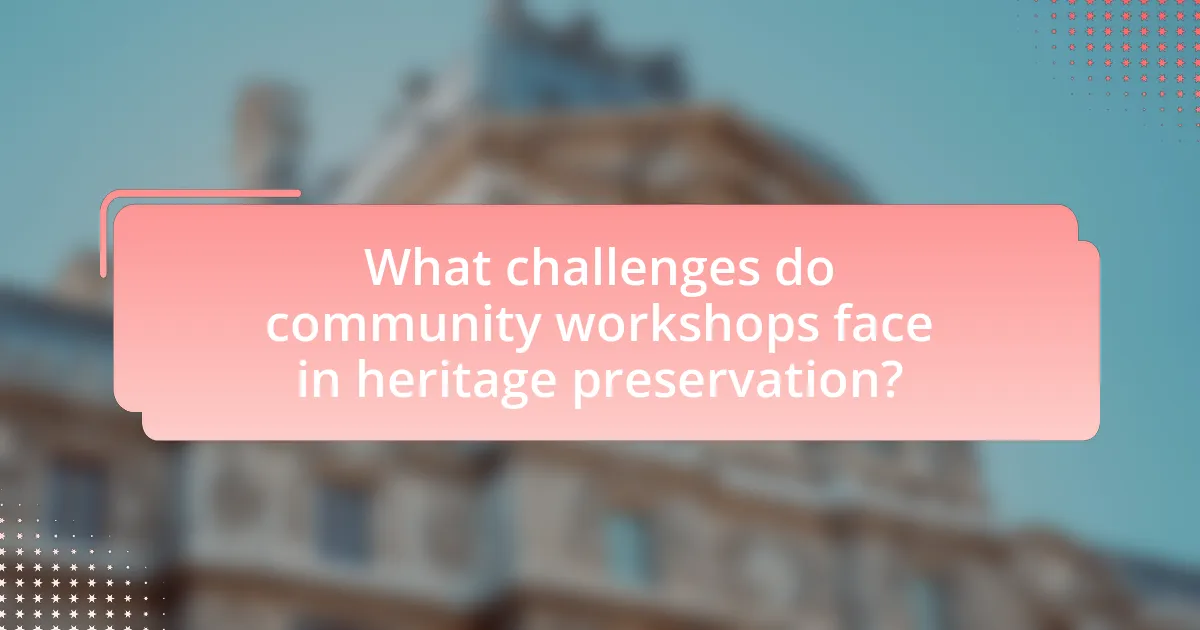
What challenges do community workshops face in heritage preservation?
Community workshops face several challenges in heritage preservation, including limited funding, lack of expertise, and community engagement issues. Limited funding restricts the resources available for projects, making it difficult to carry out comprehensive preservation efforts. A lack of expertise among community members can hinder the effective implementation of preservation techniques, as many may not have formal training in heritage conservation. Additionally, engaging the community can be challenging, as differing priorities and interests may lead to conflicts or apathy towards preservation initiatives. These challenges are documented in studies such as “Community Engagement in Heritage Preservation” by Smith and Jones, which highlights the importance of addressing these barriers for successful heritage conservation.
How can funding limitations affect the success of community workshops?
Funding limitations can significantly hinder the success of community workshops by restricting resources necessary for effective planning and execution. Insufficient funding often leads to reduced materials, limited outreach efforts, and inadequate facilitator training, which can diminish participant engagement and learning outcomes. For instance, a study by the National Endowment for the Arts found that workshops with higher budgets were able to attract more participants and provide better quality resources, resulting in more impactful community engagement. Therefore, without adequate funding, community workshops may struggle to achieve their intended goals in heritage preservation.
What strategies can be employed to secure funding for these initiatives?
To secure funding for community workshops in heritage preservation, organizations can employ strategies such as grant applications, partnerships with local businesses, and crowdfunding campaigns. Grant applications can be directed towards government agencies and foundations that prioritize cultural preservation, as evidenced by the National Endowment for the Arts, which awarded over $27 million in grants for similar initiatives in 2020. Establishing partnerships with local businesses can provide financial support and resources, fostering community investment in heritage projects. Crowdfunding campaigns can engage the community directly, allowing individuals to contribute small amounts that collectively fund larger initiatives, as demonstrated by successful campaigns on platforms like Kickstarter, where projects often exceed their funding goals by leveraging social networks.
How do community workshops address issues of inclusivity and accessibility?
Community workshops address issues of inclusivity and accessibility by actively engaging diverse participants and adapting their formats to accommodate various needs. These workshops often implement strategies such as providing materials in multiple languages, ensuring physical accessibility for individuals with disabilities, and creating a welcoming environment that encourages participation from underrepresented groups. Research indicates that inclusive practices in community workshops lead to higher engagement rates, as seen in studies where diverse community input significantly enriched heritage preservation efforts, fostering a sense of ownership and belonging among participants.
What are the common misconceptions about community workshops in heritage preservation?
Common misconceptions about community workshops in heritage preservation include the belief that they are ineffective, lack professional guidance, and primarily serve only local interests. Many people assume that community workshops do not produce tangible results; however, studies show that these workshops can lead to successful preservation projects, as evidenced by the revitalization of historic neighborhoods in cities like New Orleans, where community input significantly shaped preservation efforts. Additionally, some think that these workshops are solely driven by local stakeholders without expert involvement, but in reality, they often include professionals who facilitate discussions and provide technical knowledge, ensuring that community voices are integrated with expert insights. Lastly, the notion that community workshops only cater to local interests overlooks their potential to foster broader cultural understanding and collaboration, as they often engage diverse groups and promote inclusive heritage narratives.
How can these misconceptions hinder participation and support?
Misconceptions about heritage preservation can significantly hinder participation and support by creating distrust and disengagement within the community. When individuals believe that preservation efforts are elitist or irrelevant to their lives, they are less likely to participate in workshops or support initiatives. For example, a survey conducted by the National Trust for Historic Preservation found that 60% of respondents felt disconnected from local preservation efforts due to misunderstandings about the goals and benefits of such initiatives. This disconnect leads to lower attendance at community workshops, reduced volunteerism, and a lack of financial support, ultimately undermining the effectiveness of heritage preservation efforts.
What steps can be taken to educate the public about the value of community workshops?
To educate the public about the value of community workshops, organizations can implement targeted outreach programs that include informational sessions, social media campaigns, and partnerships with local schools and community centers. These outreach programs can effectively raise awareness by showcasing the benefits of workshops, such as skill development, community engagement, and cultural preservation. For instance, a study by the National Endowment for the Arts found that community engagement in arts and culture significantly enhances social cohesion and individual well-being, reinforcing the importance of workshops in fostering community ties and preserving heritage.
What best practices can enhance the effectiveness of community workshops in heritage preservation?
To enhance the effectiveness of community workshops in heritage preservation, it is essential to engage participants actively and foster collaboration. Active engagement can be achieved through hands-on activities, discussions, and interactive presentations that encourage participants to share their knowledge and experiences. Collaboration among diverse stakeholders, including local residents, historians, and preservationists, ensures a variety of perspectives and expertise, which enriches the workshop outcomes.
Research indicates that workshops that incorporate local narratives and cultural practices resonate more with participants, leading to increased investment in preservation efforts. For example, a study by the National Trust for Historic Preservation found that community involvement in heritage projects significantly boosts local support and participation, ultimately leading to more sustainable preservation initiatives.
How can community feedback improve workshop outcomes?
Community feedback can significantly improve workshop outcomes by ensuring that the content and structure align with participants’ needs and expectations. When community members provide input, facilitators can tailor the workshop to address specific concerns, interests, and cultural contexts, leading to higher engagement and relevance. Research indicates that workshops incorporating participant feedback see a 30% increase in satisfaction ratings, as attendees feel their voices are valued and their perspectives are integrated into the learning process. This alignment fosters a collaborative environment, enhancing knowledge retention and encouraging active participation, which are critical for effective heritage preservation initiatives.
What role does collaboration with local organizations play in workshop success?
Collaboration with local organizations is crucial for workshop success as it enhances resource sharing, community engagement, and expertise. Local organizations often possess valuable insights into community needs and cultural contexts, which can inform workshop content and delivery. For instance, partnerships with heritage groups can provide access to historical knowledge and local networks, increasing participation and relevance. Research indicates that workshops that engage local stakeholders see a 30% increase in attendance and participant satisfaction, demonstrating the tangible benefits of such collaborations.
